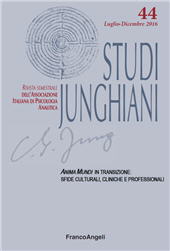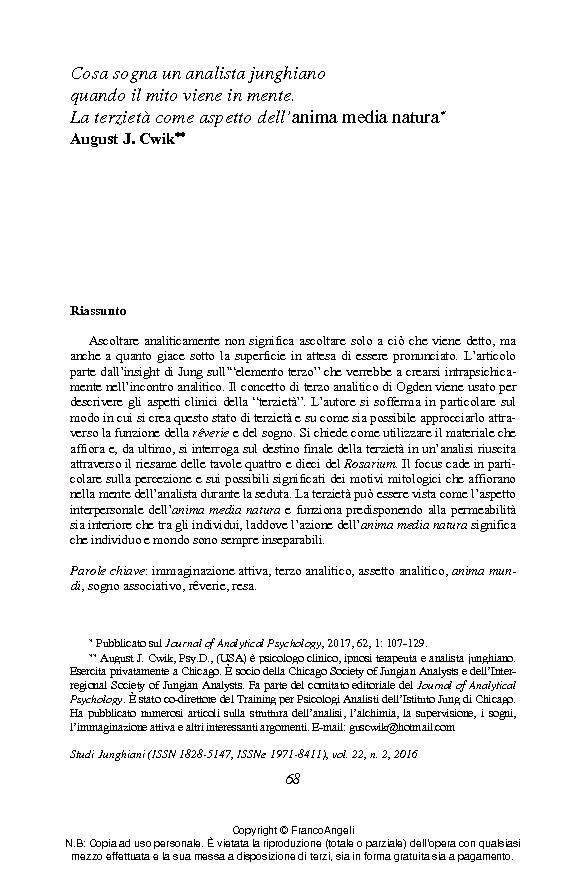Cosa sogna un analista junghiano quando il mito viene in mente : la terzietà come aspetto dell'anima media natura
68-89 p.
Ascoltare analiticamente non significa ascoltare solo a ciò che viene detto, ma anche a quanto giace sotto la superficie in attesa di essere pronunciato. L'articolo parte dall'insight di Jung sull'"elemento terzo" che verrebbe a crearsi intrapsichicamente nell'incontro analitico. Il concetto di terzo analitico di Ogden viene usato per descrivere gli aspetti clinici della "terzietà". L'autore si sofferma in particolare sul modo in cui si crea questo stato di terzietà e su come sia possibile approcciarlo attraverso la funzione della rêverie e del sogno. Si chiede come utilizzare il materiale che affiora e, da ultimo, si interroga sul destino finale della terzietà in un'analisi riuscita attraverso il riesame delle tavole quattro e dieci del Rosarium.
Il focus cade in particolare sulla percezione e sui possibili significati dei motivi mitologici che affiorano nella mente dell'analista durante la seduta. La terzietà può essere vista come l'aspetto interpersonale dell'anima media natura e funziona predisponendo alla permeabilità sia interiore che tra gli individui, laddove l'azione dell'anima media natura significa che individuo e mondo sono sempre inseparabili. [Testo dell'editore].
Listening analytically is not listening just to what is said but listening to what is just below the surface waiting to be said. This paper looks at Jung's insight into a 'third thing' being created intra-psychically and within the analytic encounter. Ogden's concept of an "analytic third" is used to describe the clinical aspects of this thirdness. This paper explores: how the state of thirdness is created and accessed through use of reverie and associative dreaming; how the material emerging from it is used in a from or about manner; and the eventual fate of the third in a successful analysis by a re-examination of plates four and ten of the Rosarium. The focus is particularly on the awareness and possible meanings of mythological motifs appearing in the mind of the analyst while in session. Thirdness can be viewed as the interpersonal aspect of the anima media natura and functions in a way that informs us of permeability in and between individuals, while the operation of the anima mundi means that there is.
always an inseparability of the individual with the world. [Publisher's Text].
-
Articles from the same issue (available individually)
-
Information
ISSN: 1971-8411
KEYWORDS
- Active imagination, analytic mindfulness, analytic third, anima mundi, associative dreaming, rêverie, surrender



